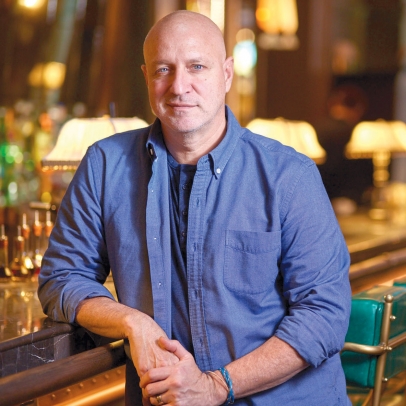TOM COLICCHIO: Top Chef, Food Security Advocate
PRIORITY: ELIMINATING HUNGER IN AMERICA
“They are playing politics with farmers who need insurance against disaster. They are playing politics with people who are hungry. I don’t think having more hungry people is the answer.”
Hunger in America is an urgent problem.
Yet, we could solve it—overnight—if we had the will to do so, says Top Chef’s Tom Colicchio.
Colicchio, a New Jersey native and food security advocate, outlined a few keys points in his vision for a hunger-free nation during a recent interview with Edible Jersey.
Imagine if a New Jersey farm were to provide fresh fruits and vegetables directly to a New Jersey school. Each child could begin the day with a nutritional breakfast, straight from the farm, without stigma because breakfast is free for everyone. That farm would have a stable market. Those children would be better nourished, more attentive and would score better on tests.
Farm-to-school initiatives are not novel. In the 2016–2017 school year, 17,600 New Jersey students benefitted from a federally funded school breakfast program administered by the New Jersey Department of Agriculture. Yet more than 308,000 children live below the poverty line in New Jersey (according to the US Census).
Colicchio is executive producer of A Place at the Table, a 2012 film about hunger in America. Chefs, he notes, are often among the first responders when disaster strikes (witness José Andrés and his efforts in Puerto Rico) and have front-line familiarity with food security issues.
Colicchio is keeping a close eye on the federal Farm Bill, which includes funding for the Supplemental Nutrition Assistance Program, designed to help lower-income families buy food. In 2014, the program helped to lift 4.7 million Americans out of poverty, according to a report by the National Sustainable Agriculture Coalition. Recipients receive an average of $4.18 per day or $1.40 per meal.
This year, the president wants to cut SNAP funding, and has endorsed a plan to replace the benefit with a box of pre-selected foods to individuals and families who receive the benefit—including shelf-stable milk, peanut butter and beans.
“Obviously the president’s idea is such a bad idea on so many levels,” says Colicchio. “It doesn’t take diet into consideration. It doesn’t take culture into consideration. It removes fresh fruits and vegetables.”
SNAP offers help to America’s most vulnerable populations— 75% of SNAP households include a child, an elderly person or a person with disabilities; 82% of all program benefits go to such households, according to the agriculture coalition. And, says Colicchio, the program benefits 1.5 million veterans. “Is someone going to suggest they’re lazy and don’t deserve it? Probably not.”
Yet, detractors focus on the few people who game the system. As a nation, the issue of hunger doesn’t register. We just don’t notice.
Colicchio reminded us of that in 2014, when he spoke in favor of SNAP benefits at the Community Food Bank of New Jersey in Hillside. (Colicchio grew up in Elizabeth.)
“If your kids are in school, I guarantee they’re going to school with kids who are hungry.”
As a nation, we are overweight yet malnourished. “Calories are cheap,” says Colicchio. “Nutrition is expensive.”
We’ve done a great job helping farmers who produce commodity crops (corn, soy), notes Colicchio. But incentives are few for fruits and vegetables. “We’ve done very little at looking at fruits and vegetables and increasing their yield. Fruits and vegetables cost a lot of money.” Our food policies, says Colicchio, ought to support people who eat, as opposed to corporations. We ought to support a more healthful diet.
What should consumers do? Push back, says Colicchio. Parents should demand Jersey broccoli and corn in the schools. Farmers should want schools as customers. Government works for us—these are our tax dollars. “You can demand a better government,” says the chef.
“They are playing politics with farmers who need insurance against disaster. They are playing politics with people who are hungry. I don’t think having more hungry people is the answer.”




